|
We are living in a time of two pandemics- racial injustice and Covid-19. This year has shed a light about many structural inequities based on intersection of race and class. Some of us are awakening to how much we did not know about the realities of black and brown lives- the notion that the United States was founded on white supremacy and that persists today in implicit and explicit bias. Resmaa Menakem talks about how simply being born in a non-white body is a traumatic experience. Just as we are gendered from an early age we are racialized. Certain doors are closed and certain assumptions are made about individuals simply based on the color of their skin. On top of all that we have seen the deaths of loved ones and heroes. We may have lost our jobs, our homes, our regular routines. Things that once used to anchor us have become unsteady or been removed. We are experiencing a collective trauma. Trauma is anything that overwhelms our nervous system and mind. It often brings up the sense of being frightened. We unconsciously move into fight, flight, or freeze/shut down to cope. We lose capacity to fully think, have compassion for others, find gratitude, or see each others full humanity. Typical trauma symptoms are depression, anxiety, engaging in numbing behaviors, rage, irritability, despair, difficulty with sleep, loss of motivation, feelings of shame, hopelessness, eating too little or too much, shutting down. We have become even more polarized as a country. Many people are terrified about the upcoming election and who will be the next supreme court justice. I invite you to not turn away from your discomfort, from your not knowing. To not stay in despair or terror for long. This is an opportunity. An opportunity to explore what is coming up for us. What traumas have we experienced in our lives? What is our body trying to tell us? What are wounds within me that I have not touched or cared for tenderly? What is the body remembering of feeling scared, not feeling heard, not feeling seen, not being in control? This is an opportunity to find something to ground in. Perhaps the anchor is faith, our ancestors who have been through difficult times before, perhaps it is a spiritual practice. Can we remember to breathe into this moment exactly as it is. Noticing the tendency of the mind to travel to the future and create catastrophic possibilities. A reminder to come back to the present moment again and again. I heard Thomas Hubl say: “Are you willing to take a step when there is no floor? When you take a step the floor appears.” If we keep turning away from our pain our world becomes smaller and we lose opportunity to transform, to evolve, to increase our capacity to tolerate not knowing and discomfort. We can gain clarity over time. Can we find community to help support us on this confusing journey. Community can help us expand rather than contract. Beautiful things can arise from the ashes, from the mess especially when we support each other through it. Can we grieve together? I offer you this meditation that has been inspired by a book I read years ago by Sylvia Boorstein called “Happiness is an inside job”. Please be tender with yourself: Sweetheart. I know you are in pain. Relax. Take a breath. Check in with what is happening inside of you and outside of you. Take your time. When you are ready we will figure out what to do. What I love about this meditation is that it has all the qualities of a grounding, compassionate practice. Refer to yourself by some sort of nickname, perhaps naming your inner child. Acknowledge that you are in pain. Invite in ease and softening. Take several conscious breaths to help calm our nervous system. Check in with how your body is talking to you, what are the images and thoughts coming and going. What is happening around you. No need to rush this process. Trust that when you are ready you will know how to proceed. What gives me hope is that if more and more people are connecting to the collective grief and trauma that has been going on in this country for hundreds of years things have to change. Old structures cannot persist if we keep putting one foot in front of the other. We can be tender with ourselves and each other while still being fierce in our pursuit of justice for all. How do we all get free. Join me in an upcoming workshop to dive deeper into trauma sensitive yoga, anti-racism, or meditation as a self-care practice. More info available here. Have you heard about "anti-racism" recently?In the last few months we have seen a centering of the ways systemic racism affects Black and Latinx communities in a different way. Especially when it comes to higher proportion of deaths by COIVD, police brutality, healthy and economic inequities. We have heard and seen black grief and rage and may not understand the trans-generational and cumulative impact of 400 hundred years of discrimination because we likely grew up in the time of color blindness. You may have only recently heard the phrase "anti-racism". Making Your Therapy Practice More Anti-RacistYou likely have been wondering how you can be more of an anti-racist practice. Of course, you feel for the BIPOC (black, indigenous, and people of color) communities. You support the premise of Black Lives Matter [too] and care about diversity, equity and inclusion in your practice. You have often thought I am not a racist, but have begun thinking are you anti-racist? What does it actually mean to be anti-racist? It is taking an active stance against racism. To be “not a racist” is a stance of neutrality. It is often being indifferent or minimizing the legacy of white supremacy in this country that supports the white supremacy system continuing. Check out my other blog post about white supremacy and history of racist policies. The reality is we are all indoctrinated and conditioned into white supremacy [the system that creates white privilege]. We likely learned a Eurocentric curriculum in school. We might have grown up or currently live in segregated areas. We went to graduate school and learned therapy models that centered white, cis, male, heterosexual, able bodied, neurotypical, Christian, upper middle class theories of understanding human behavior, culture and therapy. Unlearning Racism to Embrace Racial Justice and Anti-RacismWe have an opportunity to unlearn racist ideas but first we must deconstruct our current paradigm that centers whiteness without naming whiteness. We have to lift the veil and make visible what has been invisible. There are a lot of different anti-racist or diversity, equity and inclusion options out there. Why is mine different? I really embrace a paradigm shift for everyone (no matter what your race is or how you have been an ally in the past). I bring a mindfulness lens to all trainings and conversations along with a clinical background. As a black licensed clinical psychologist who is also a yoga teacher and somatically trained, married to a cis white man, raising bi-racial children who has worked in community mental health, been a clinical and administrative director at partial hospital, intensive outpatient and inpatient programs, worked in college counseling center and owns a group practice I have seen the ways anti-racism is rarely embraced as a value in a way that transforms a culture. white supremacy and racism lives in our bodiesWe bring those bodies into our therapy rooms and our bodies talk to each other. When we talk about racism we have to do it not only from a cognitive place but also a fully embodied stance so true transformation can occur. We have to understand how implicit bias takes root unconsciously and how our bodies react first and then the mind follows. We have to learn to settle our bodies (engage our ventral vagal nerve) as Resmaa Menakem talks about. Learning about different cultures (cultural competence) is great and yet not enough if our paradigm doesn’t shift and reduce our implicit bias. We have to embrace cultural humility, a recognition that we often don't know and will always be learning. How do we move away from centering whiteness as the norm?How do we create truly inclusive spaces- spaces that welcome the intersectionality of identities, that affirm the inherent worth and dignity of all beings. How do you start to critically analyze from an anti-racist lens and do a power analysis? How do you recognize the barriers to having productive, embodied discussions about race? Who do your websites and marketing materials speak to? What is not explicitly stated? Where is your practice located and who can easily access your services? What is your payor mix? How do you hire and retain BIPOC clinicians? How do you partner and become an ally for BIOPC communities from a genuine place rather than a performative place? How do you hold space for black rage and grief as well as the intergenerational trauma of racism? How do you start to see the model minority stereotype as anti-blackness culture? How are you unintentionally committing microaggressions and how do you repair that? How do you build shame resiliency and skills to sit in discomfort? There are certain values related to white supremacy culture.
When we start to intersect it with other identities we uncover sexism, heterosexism, transphobia, xenophobia, ableism, and religious intolerance. An Anti-Racism Assessment for OrganizationsI have adapted this anti-racism assessment grid from National Juvenile Justice Network which looks at the culture of different organizations. There are four main categories:
Embrace the Best of Yourself, Reject Shame and Become More Anti-RacistWhat if you were to embrace "I want to get it right rather than I want to be right" as Brene Brown says when she talks about moving away from unhealthy shame to accountability? How do we step into vulnerability to address your blindspots, the areas that you were purposely never thought because white supremacy system cannot persist if everyone is awake and aware about the anti-blackness culture that is the foundation of the United States. Shame is not a social justice tool but rather a symptom of white supremacy. Shame interferes with our ability to feel empathy, build bridges or invite people into the conversation. How can you create more healing in your communities for white, black, indigenous, people of color, and multiracial people where there is less stigma about mental health issues and therapy is more accessible for everyone in your community? Are you ready to get started with an anti-racism consultant?Check out my anti-racism resource page to start this process. Schedule a training for your staff. Join one of my upcoming trainings. Purchase an online training video. Learn more about me here.
Part of what I have learned from Eastern philosophy is this concept of metta meditation. This is also known as loving kindness meditation. You repeat a couple of phrases and wish yourself well, a loved one well, and someone who is difficult in your life or caused you harm. The idea is to have the intention of wishing this person well. Sometimes it is easy to say it and sometimes it is difficult. Ultimately when we hold on to anger, it stops being healthy and can make us sick. I wish people well so that I don’t hold on to their pain and hate. People ask me when I make an anti-racist comment, video or blog and have people say harmful things to me why don’t I ignore it. Sometimes I do ignore it if I am not in an emotionally resourced place to address it. I think sometimes it does me more harm to ignore it. I carry their pain (anger, sadness, shame) in my body, in my energetic zone and that is not helpful to me. I find myself ruminating about what they said and all the ways I can challenge it. When I reply from a grounded place and am able to still see their humanity by wishing them well it frees me. I can move on more easily. I let go of someone winning or losing. Grounded doesn’t mean I don’t feel a lot of emotions. Rage or sadness is often simmering but it hasn’t hijacked my nervous system to the point that I can’t see the multiple truths. I remind myself that many people, particularly white people, have been taught a certain narrative about post racial United States and that if people work hard enough they can be successful as well. It seems that the concept of racism, individual and systemic racism, excites strong emotion in people to the point they have polarizing conversations where they cannot see the other person’s viewpoint. At extremes we forget that we are each human and start to attack each other rather than build curiosity and common ground. I love how Ruth King invites us to think about the following things when you are inviting people into conversation about race, rather than calling them out:
This is one of my favorite exchanges and gives me hope: Him: 94% of black deaths are caused by black men. Me: I wonder the context of this data. Hard for me to know without more than one line shown. Could you send an article?How do systemic issues contribute to individual issues while holding individuals accountable. Him: easy go to FBI crime statistics and research the truth Me: interesting to think that a system designed to police Black people is the only truth out there. Who gathers the info, what is it used for, who tends to be profiled? What data isn’t collected? What leads certain communities to be so impoverished and desperate and internalize racism. Just some of the things I tend to think about. Thank you for telling me your source. Him: funny. You change the topic without any research. You know the truth. All I know in this world is a victim stays a victim. Why have people succeeded in getting out but majority stay in sane circumstances Him: Democrat community gives data to the fbi. Keeping voting blue, then people stay impoverished Me: there is so much we could talk about. Too bad social media platform isn’t the place to have deep conversations that help people understand each other’s perspectives in my opinion. Thanks for engaging with me for a little while. I appreciate hearing how others come to understand things. So curious about the ways the Republican Party is trying to address poverty especially in black and Latinx communities to decrease the longstanding wealth gap. Will look for that in their platform. Him: historic minority and female unemployment and earnings. Opportunity zones in black poor areas. I would research the period between 40s to civil rights in 67’ and wonder why black Americans stopped prospering after civil rights as they did before civil rights. Very interesting info. I love a smart discussion 🙏❤️ Me: Wishing you well. If you are interested in learning more about having race based discussions from a mindful and compassionate place and invite people into conversation, sign up for one of my upcoming offerings. Next anti-racism workshop is 8/8. Full list can be found here. Check out my RAIN meditation to help take a breath and slow down when conversations cause you distress. |
Details
AuthorNathalie Edmond is a licensed clinical psychologist specializing in the treatment of trauma from a mindfulness based and somatic approach. She is also a yoga teacher and anti-racism educator. She lives with her family in New Jersey. Archives
October 2023
Categories
All
|
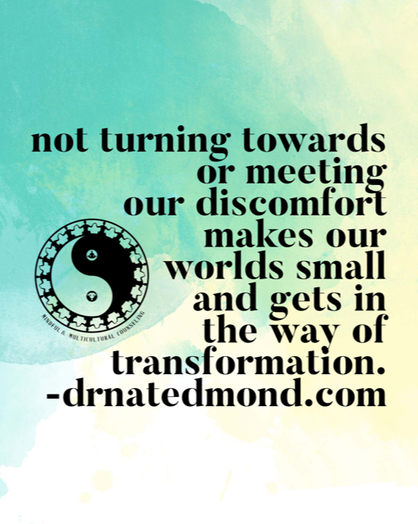
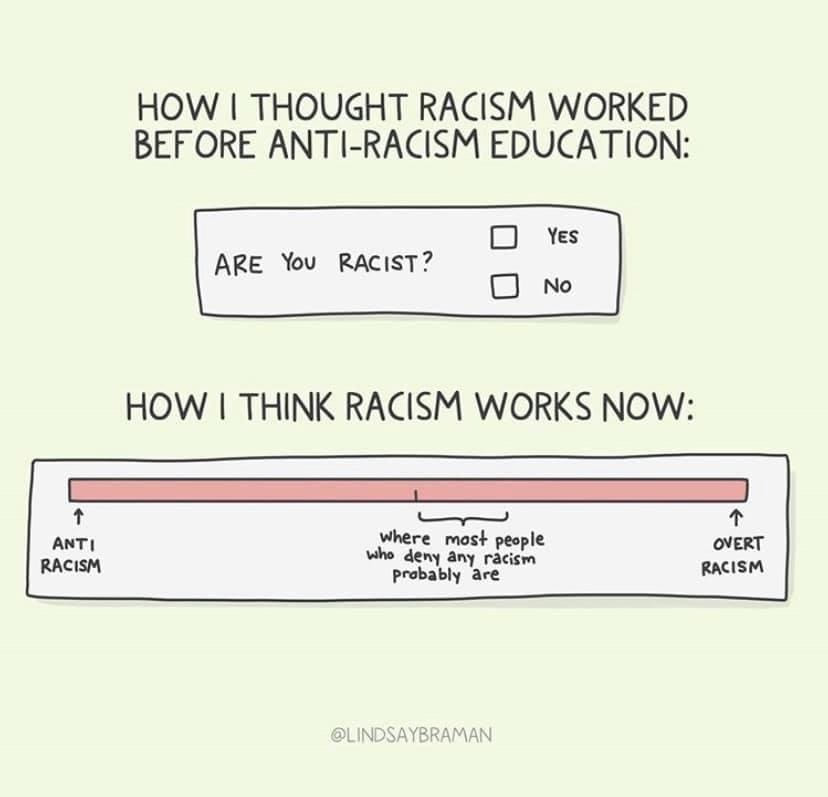
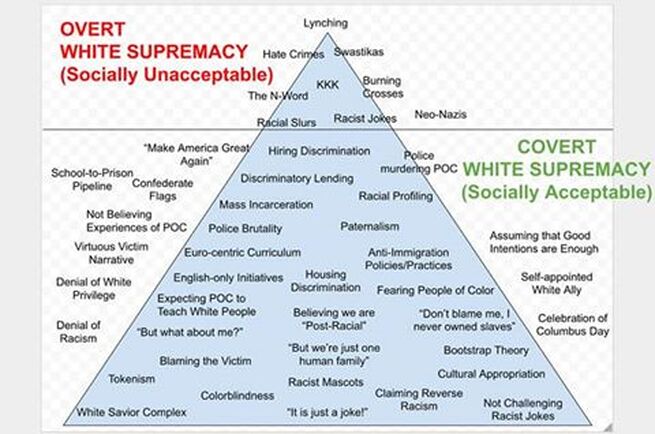
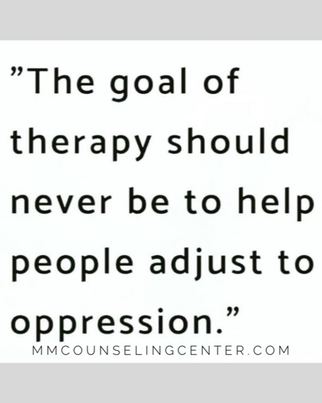
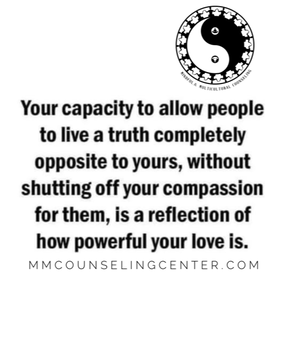
 RSS Feed
RSS Feed